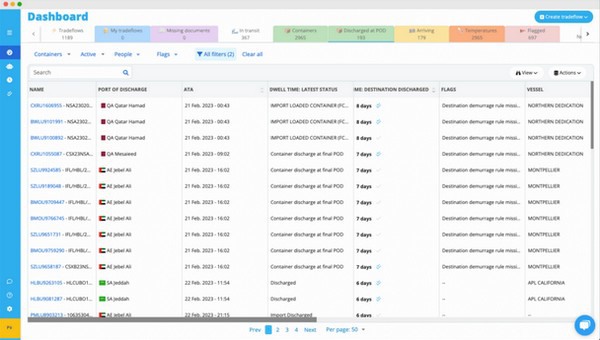Making logistics teams' work more efficient and enjoyable by giving them the correct tools so they can focus on other tasks and offer their partners the right service. That is Dockflow's goal. "Logistics service providers must often keep track of hundreds, sometimes thousands of containers," begins this Belgian company's Pauline Van Ostaeyen. "Doing that manually takes incredibly long. We want our platform and the correct tools to offer a solution. Simply put, our mission is to build the world's first logistics enablement platform."
The platform started in early 2020 when there was an increasing need for detailed tracking in the fresh produce sector. "A partner and we wanted to minimize demurrage (a fee shipping companies received for delays for which they aren't responsible). Then the pandemic hit. That naturally brought its challenges. All warehouses closed, and terminals were delayed, so demurrage costs suddenly skyrocketed. That showed that maritime transport had developed a real problem, prompting us to want to offer a solution with our tool," says Pauline.

The Dockflow team
AI and blockchain
That resulted in a platform that Dockflow wants to use to take much of the work off logistics service providers' hands. "You can see it as such: When you order something from UberEats, you can track the delivery person from the restaurant to your door at all times. That works very well for pizza boxes. But can it also work for larger ones, like maritime and especially reefer containers? It may sound simple, but making that happen requires plenty of expertise."
"That was urgently needed, though, because it used to be that when a container's doors closed, it became a black box. Once it was on its way, no one knew where the container was, where it was going, its internal temperature, what was inside, or how long it would take to arrive. We at Dockflow wanted to provide insights so logistics teams, importers, and exporters could regain control of the situation," Pauline explains.
The platform uses AI and blockchain to achieve that. "It takes about 30 parties to get a piece of fruit to the consumer. Each has a small piece of information about the above questions. Dockflow uses AI to collect these snippets of information from different sources to give its users a complete picture. One part is, for example, reefer container monitoring, where we place sensors through our partner Sensitech."
"Those precisely track the containers' location. We can combine that detail with data from shipping companies, ports, terminals, importers, and exporters. All that's collected, an algorithm considers where things might go wrong, and the user is informed. You, thus, get a fully transparent overview of all data during transport, which you can share with your customers or partners," Pauline points out.
"Preventing demurrage costs is still one of our most used applications. The goods' positioning and containers' internal temperature checks also prove highly beneficial. With thousands of containers, it's almost impossible to detect when something goes wrong manually. That saves significant time, allowing employees to focus on other tasks."
Emission tracking
An additional application - CO2 tracking - went live on the platform two weeks ago. "We're testing a Beta version. Companies that use our platform can keep track of their shipments' emissions. With carbon accounting in mind, it's becoming increasingly important for many companies to provide a clear picture of their cargo's emissions. Many of our clients are logistics service providers, the link that connects different parties within the chain. That's the ideal position to indicate via this application what's being emitted and achieve full transparency, which more and more chain parties require," says Van Ostaeyen.

"The tricky part, however, is that though emission tracking is needed, no one really knows how to achieve it. There's also a big problem with emissions transparency and validation. Consider, for instance, a tree planted to offset a company's emissions. Ten companies claim to have planted those, but not ten were planted. Instead, those businesses use the same tree to compensate for their emissions."
"That's a greatly simplified comparison, but it demonstrates that there are major problems in emission output transparency, especially in offsetting it. With our platform's transparency, we want to ensure each company can genuinely claim only one tree for its emission output. That can provide good insight for all parties involved," states Pauline.
Everything that needs transportation
Dockflow has already made significant progress with these tools. "We started with several companies in the Antwerp and Rotterdam area. However, since fresh produce is so international, the companies that use our platform to share data introduced Dockflow to their partners and clients. They became familiar with it, and as soon as they wanted more transparency and to limit demurrage costs, they turned to us. We, therefore, built a global customer base quite quickly. Especially in a sector like this, that can happen very fast."
"Also, although we originated in fresh produce, more and more clients, especially in chemicals and steel, have started using Dockflow. They don't use the tools for temperature checks, but they can constantly track the goods. The platform is relevant for everything that needs transportation. We hope to completely relieve logistics service providers in the tracking process. Ultimately, we want to develop various tools to bring logistics teams into the 21st century," Pauline concludes.
For more information:
Pauline Van Ostaeyen
Dockflow
7 Sint-Pietersvliet
2000, Antwerp, Belgium
Tel.: +32 (0) 33 76 46 07
hello@dockflow.com
www.dockflow.com
